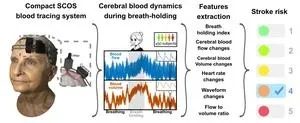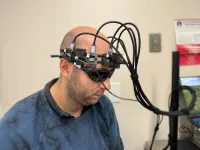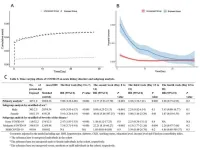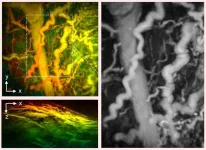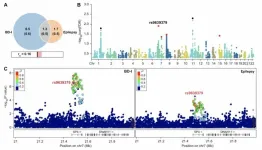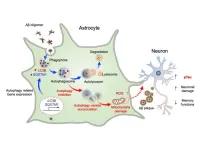(Press-News.org) People who have been fully vaccinated against COVID-19 have a significantly lower risk of developing more severe cardiovascular conditions linked to COVID-19 infection, according to a nationwide study at the University of Gothenburg. At the same time, some cardiovascular effects are seen after individual doses of the vaccine.
The COVID-19 vaccine aims to reduce complications and overall mortality from the disease. At the same time, some cardiovascular effects have been seen after individual doses of the vaccine. A rare acute side effect is inflammation of the cardiac muscle or the pericardium in young men following mRNA vaccination. In terms of other cardiovascular effects, there has only been limited research and the results have been conflicting.
The current study, published in the European Heart Journal, is a register-based, nationwide study. It is based on data from the entire population of more than eight million adults in Sweden who were followed up in national healthcare registers for around two years, from the end of December 2020 when COVID-19 vaccination began until the end of 2022.
The researchers have studied ‘risk windows’ (the time immediately after a single injection of the COVID vaccine), dose by dose, in those who were vaccinated. The cardiovascular health after full vaccination has then been compared with the cardiovascular health of those who, at the same stage of the study, had not started any vaccination.
Risk analyses for cardiovascular disease
The study includes risk analyses for a number of cardiovascular diseases related to both the heart and the brain: inflammation of the cardiac muscle or the pericardium, cardiac arrhythmia, heart failure, TIA, and stroke – the latter two being caused by impaired blood flow in the brain.
For most of the outcomes – particularly the more serious ones – there was a reduced risk of cardiovascular events after vaccination, especially after the third dose. The risk of cardiovascular events after being fully vaccinated was generally 20–30% lower than if no vaccination had been initiated. At the same time, the study also confirms the increased risk of inflammation of the cardiac muscle or the pericardium one to two weeks after a single mRNA injection against COVID.
The study also observed a temporarily increased risk of extrasystoles – additional heartbeats – after dose one (17% higher risk) and dose two (22% higher risk), and this was stronger among elderly and males. There was no increased risk of other serious cardiac arrhythmias after being vaccinated.
The risk of stroke was lower after vaccination than without vaccination, while the risk of TIA was temporarily higher (13% higher risk) after a single dose of vaccination, mainly in older men.
Protective benefits of the vaccine
The research was carried out at the School of Public Health and Community Medicine at the University of Gothenburg’s Sahlgrenska Academy, with Fredrik Nyberg, a Visiting Professor in Register Epidemiology, and Yiyi Xu, an Associate Professor in Occupational and Environmental Medicine, having main responsibility for the study. Other authors include Mats Börjesson, a cardiologist and Professor of Sports Physiology, and Magnus Gisslén, an infection specialist, Professor of Infectious Diseases, and State Epidemiologist.
“The increases in cardiovascular risk we saw following COVID-19 vaccination are temporary, and do not apply to the more severe conditions,” says Professor Nyberg. “On the other hand, full vaccination significantly reduced the risk of several more severe cardiovascular outcomes linked to COVID-19, such as heart attack, stroke, and heart failure. This emphasizes the protective benefits of full vaccination.”
END
Reduced risk of serious cardiovascular disease after COVID vaccination
2024-09-30
ELSE PRESS RELEASES FROM THIS DATE:
New laser-based headset can measure blood flow, assess risk of stroke
2024-09-30
When physicians want to know more about a patient’s risk of cardiovascular disease, they can order a cardiac stress test. But when it comes to risk of stroke, there is no equivalent scalable and cost-effective test of the brain’s function to help physicians counsel patients on their potential risk. A questionnaire that asks patients about contributing risk factors is currently the best tool for estimating such risk.
Now a team of engineers and scientists from Caltech and the Keck School ...
Researchers close in on understanding possible cause of Alzheimer’s disease
2024-09-30
CLEVELAND—With a four-year, $3.3 million grant from the National Institutes of Health (NIH), researchers from Case Western Reserve University will study whether certain brain proteins may play a role in the development of Alzheimer’s disease.
Alzheimer’s disease is a brain disorder that slowly destroys memory and thinking skills. According to the Alzheimer’s Association, nearly 7 million Americans 65 and older are living with the disease and there are more deaths from Alzheimer’s than breast and prostate cancer combined.
Previous research has ...
New synthesis strategy could speed up PFAS decontamination
2024-09-30
HOUSTON – (Sept. 30, 2024) – Rice University engineers have developed an innovative way to make covalent organic frameworks (COFs), special materials that can be used to trap gases, filter water and speed up chemical reactions. COFs have the potential to address significant environmental challenges, including energy storage and pollution control. An example of that is their potential use in the decontamination of “forever chemicals” or per- and polyfluoroalkyl substances (PFAS).
Rice chemical engineer Rafael Verduzco and his team have described a new way to synthesize high-quality ...
COVID-19 linked to increased risk of acute kidney disorders: New study reveals time-varying effects
2024-09-30
Researchers from West China Hospital, Sichuan University, have conducted a study revealing a significant association between COVID-19 and acute kidney disorders (AKD), including acute kidney injury (AKI), that varies over time. The study, led by Dr. Li Chunyang and Dr. Zeng Xiaoxi from the West China Biomedical Big Data Center, was recently published in the journal Health Data Science.
COVID-19, known for its impact on the respiratory system, also affects other organs, including the kidneys. The study aimed to investigate the time-dependent effects of COVID-19 on acute kidney disorders. Using data from the ...
Medical imaging breakthrough could transform cancer and arthritis diagnosis
2024-09-30
A new hand-held scanner developed by UCL researchers can generate highly detailed 3D photoacoustic images in just seconds, paving the way for their use in a clinical setting for the first time and offering the potential for earlier disease diagnosis.
In the study, published in Nature Biomedical Engineering, the team show their technology can deliver photoacoustic tomography (PAT) imaging scans to doctors in real time, providing them with accurate and intricate images of blood vessels, helping inform patient care.
Photoacoustic ...
Genetic link between bipolar disorder and epilepsy unveiled in groundbreaking study
2024-09-30
Kunming, China - A team of researchers from the Chinese Academy of Sciences has uncovered compelling evidence of a genetic link between bipolar disorder type I (BD-I) and epilepsy, potentially revolutionizing our understanding of these complex neuropsychiatric conditions. The study, published in Genomic Psychiatry on September 30, 2024, reveals shared genetic variants and a causal relationship between the two disorders, opening new avenues for research and treatment.
Led by Dr. Ming Li from the Kunming ...
Social networks help people resolve welfare problems - but only sometimes, new research finds
2024-09-30
Lead researcher Dr Sarah Nason, from Bangor University’s School of History, Law and Social Sciences explained: “Debt, benefits, special educational needs, healthcare issues, these are everyday problems that many of us face, and it’s only natural to turn to people you know and trust for help and advice. However, we found that having to talk to more people or support services was an indicator that the problem was more complex and difficult to resolve.”
The team studied four distinct areas across England and Wales: Bryngwran, a village on Anglesey in North Wales; Deeplish, a district of Rochdale in Greater ...
Honey, I shrunk the city: What should declining Japanese cities do?
2024-09-30
Aging societies and population decline have been on the rise globally, but in Japan, the situation has exasperated tenfold. A staggering 36.21 million people, or 28.9% of the populace, are 65 and over. Further, 74.6% of Japan’s 1,747 cities are categorized as shrinking, with urban policies struggling to keep up with the decline. However, the factors that correlate with population changes in cities of varying sizes have not been clarified.
Dr. Haruka Kato, a junior associate professor at Osaka Metropolitan University, ...
New brain cell cleaner: astrocytes raise possibility of Alzheimer’s disease treatment
2024-09-30
A research team led by Dr. Hoon Ryu from the Korea Institute of Science and Technology (KIST, President Sang-Rok Oh) Brain Disease Research Group, in collaboration with Director Justin C. Lee of the Institute for Basic Science (IBS, President Do-Young Noh) and Professor Junghee Lee from Boston University Chobanian & Avedisian School of Medicine, has uncovered a new mechanism involving astrocytes for treating Alzheimer’s disease (AD) and proposed a novel therapeutic target. In this study, the researchers revealed that autophagy pathway ...
American Academy of Pediatrics announces its first clinical practice guideline for opioid prescriptions
2024-09-30
Media contacts:
Lisa Robinson, lrobinson@aap.org
Alex Hulvalchick, ahulvalchick@aap.org
American Academy of Pediatrics Announces its First Clinical Practice Guideline for Opioid Prescriptions
Pediatricians should prescribe opioids for pain when necessary, with recommended precautions in place to increase safety, according to a clinical practice guideline released during the AAP 2024 National Conference & Exhibition
ORLANDO, Fla.--The American Academy of Pediatrics has published its first clinical ...

